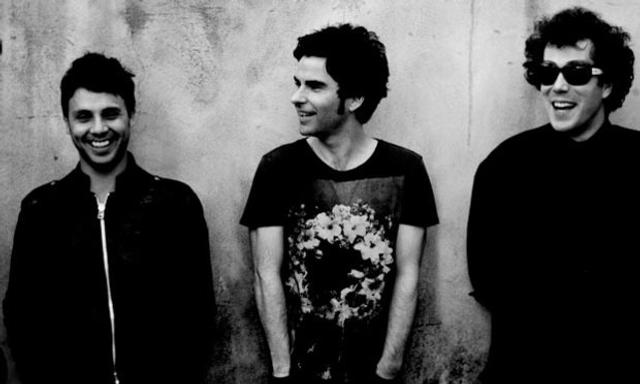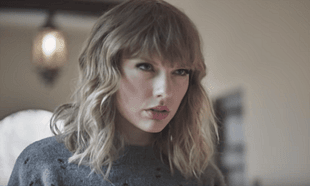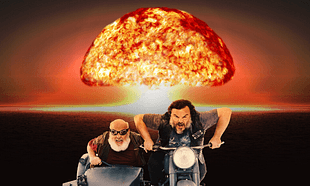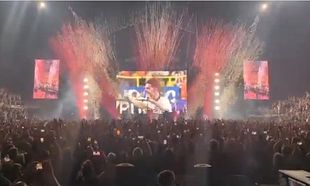Stereophonics aren't really the sort of band that need to go back to square one. One of the most successful British acts of the past twenty years, the Welsh band had churned out hit after hit with regularity but then took an almost four year hiatus at the height of their powers. Back now with a renewed sense of vigour - and a completely new approach to music, including their own record label Stylus Records - Stereophonics are eager to make up for lost time.
The band's frontman Kelly Jones spoke to our Music Editor John Balfe ahead of their show in The Olympia tomorrow night (March 9th).
Now that you've founded your own label, are you effectively your own boss?
We were on V2 forever, which was an independent label and we were the first signings. We felt good there. Then it got sold to Universal and we'd never been on a major [label] before. It worked well when we did a Greatest Hits but when we did a studio album it didn't quite feel they could concentrate on our individual projects.
They offered us the deal for this record but we just wanted to try something different and come back in a very independent way. We're not interested in signing other bands or anything, but we put a lot of work into 'Graffiti On The Train' and we just wanted to handpick a group of people who were all in it for the same goals.
So you find it freer and less restrictive working outside the major label system?
We wanted to come back by releasing a few, kind of, tastemaker short clips, videos and films. You wouldn't really be able to do that on a major label. They might just pick the strongest radio song and go with that but we just wanted a different approach. Major labels get a bit frightened spending money on things that they're not necessarily going to get money back on, you know? We are taking a few risks but we're hoping it'll pay off in the long-run.
Was there ever a notion of 'if it ain't broke, don't fix it' - was that a big call to make on your part?
Because we'd been releasing records every two years - you're constantly going around in cycle, each album takes about 15 months - it's always in the back of your mind that if you don't keep going and you don't keep the band's name in people's consciousness, would it fall away if we stopped? I think it was the Greatest Hits that gave us a bit of confidence. We'd never wanted to release Greatest Hits but when we did, we took it as a celebration of our music after ten years and it was received really well. We thought that if we do go more extreme on the next record and it fails then we've always got the catalogue.
I understand that you've also been working on a couple of screenplays?
I went to film school for about five years, doing design and into film and animation then screenwriting. BBC Wales offered me a job at the same time Richard Branson offered us a record deal, so I chose rock n' roll straight away! I've always been writing treatments and things like that but with the songs I just kind of see myself as a storyteller, whether it's music or film. I've always had a hand in writing the videos but I just wanted to try and extend that process. There's one script called 'Graffiti On The Train' which I was writing at the same time as the album, so they bounce off each other quite a bit.
So there's a lot of parallels between the screenplay and the album?
Yeah there is. I kept hearing these two guys on the roof of my house and I kept thinking they were trying to break in and I shouted out the window, 'what the fuck's going on' basically. They said they weren't trying to break in, they were trying to get to the train tracks past the trees to graffiti the train. And I thought, 'well you're still on my fucking roof!' but it was a bit nicer than thinking they were going to come in. The next song I wrote was 'Graffiti On The Train' and then that led on to this story and the music on the album is kind of a soundtrack to it.
Are the songs literally connected to moments in your screenplay?
They are in many ways. It's not like a musical or a concept but they've definitely inspired each other. The film is a rites of passage story about two young guys who leave a small town after a friend's funeral and they travel across Europe and get stuck in Paris. One is fearful and one is fearless. There's a lot of that in the music and there was a lot of that when we left a small town and went around the world. There are parallels with all of it. I've been saying it's a cross between 'Stand By Me' and 'Quadrophenia'.
Whenever I think of things like this I can't help of think of The Who's movie 'Tommy', it's not like that is it?!
[Laughs] No it's not really, there's no big boots and Elton John! What I liked about Quadrophenia was that it was a story but the music was the attitude behind it.
Getting back to the album, I get the impression that it was given free rein to be what it wanted to be and that you didn't necessarily have any preconceptions as to how it should sound, but to let it find its own life organically. Would that be accurate?
It would be accurate. It was kind of a case of going to work every day. Normally you'd commit to songs you were going to do, you'd go in over a six week period and record them and then go back on the road but with this we decided to forget about radio, forget about TV, forget about a record company - it was almost like making a debut album. We recorded 35 songs, mixed 25 and we thought about releasing a double-album but in the end we settled on ten. People's attention spans are 45 minutes these days and we can bring out the second ten a year later.
I find the notion quite interesting where in the past you'd spend six weeks recording, then a few months promoting it and then a year touring. You do this album for a short period of time, think about nothing else but once that's over there's a mental closure to it but then you're still talking about it to people, still performing it.
Yeah, it's almost back to front. It's strange, the two hours on stage is amazing but there's a lot of time hanging about or travelling. The further you get down the line the less time you want to waste because you've got so many things you want to do. Sometimes the restrictions of selling what you've done takes up too much time for me.
You're playing The Olympia tomorrow night (March 9th). I'm sure you've played there before?
We've played there once before. I remember it being a great looking room. We've got some good memories from Irish shows. It was the first place that I remember Stuart [Cable, former drummer] getting on a plane to fly to because we thought we were going abroad! It was the furthest afield we'd ever been as a band.
So you've played the small shows and the big shows over here!
Exactly, we started in Temple Bar and went to Slane Castle, then back to the Olympia and we're going to work our way back up!
Stereophonics play the Olympia in Dublin on Saturday March 9th and will appear live on the Late Late Show on Friday the 8th. Graffiti On The Train is out now.













































































